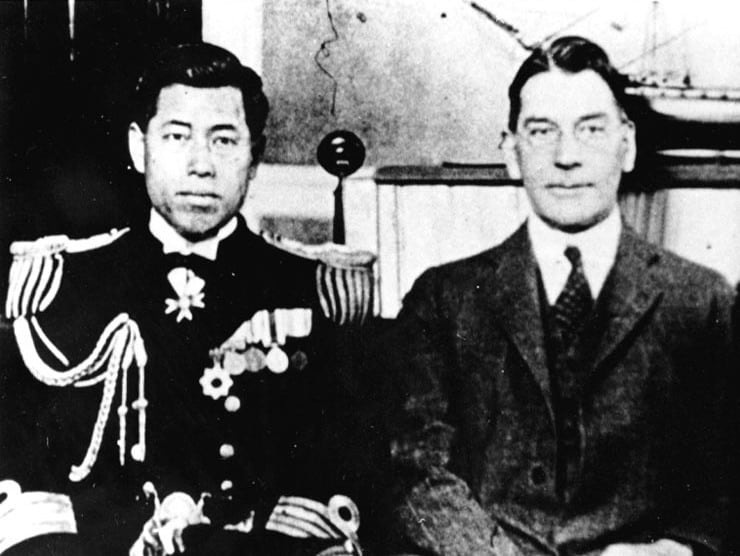
Adm. Isoroku Yamamoto, left, commander-in-chief of the Imperial Japanese Navy, is seen here in the 1920s with then-U.S. Navy Secretary Curtis D. Wilbur. Click here for background on Yamamoto’s life.
By: Phil Kohn. Dedicated to the memory of his father, GM3 Walter Kohn, U.S. Navy Armed Guard, USNR, and all men and women who have answered the country’s call in time of need. Phil can be contacted at ww2remembered@yahoo.com.
The Luftwaffe carries out a raid by Focke-Wulff-190 bombers against the island of Malta on May 21, 1943. In Japan, Radio Tokyo announces the death of Adm. Isoroku Yamamoto, commander-in-chief of the Imperial Japanese Navy, whose plane was shot down over Bougainville on April 18, 1943. President Roosevelt (who had personally ordered the attack on Yamamoto’s flight) is asked by reporters for a comment on the news (which had not previously been reported in the U.S.). His reply: “Gosh!”
From Berlin on May 22, German Grand Adm. Karl Dönitz orders the suspension of U-boat patrols in the North Atlantic because of the heavy losses caused by new Allied anti-submarine tactics. The Kriegsmarine (German navy) has lost 56 U-boats in the months of April and May of 1943 alone.
The British on May 23 claim that 313 Axis ships have been sunk in the Mediterranean since the Battle of El Alamein (which ended on November 11, 1942). The heaviest RAF air raid of the war to date is made against Dortmund, Germany, during which 2,000 tons of explosives are dropped.
German Grand Adm. Karl Dönitz on May 24 orders the majority of U-boats that had been in the Atlantic to redeploy to the less-hazardous Caribbean or to waters around the Azores, about 850 miles west of Portugal. Dr. Josef Mengele, an SS officer and physician, is appointed medical director of the Romani (gypsy) family camp of the Auschwitz concentration camp at Oświęcim, Occupied Poland. Because of his obscene genetic experiments on inmates — often children — without regard for their health or safety, Mengele comes to be known by camp inmates as “The Angel of Death.”
In Mobile, Alabama, white workers at the Alabama Dry Dock and Shipbuilding Company, incensed at the upgrading of 12 qualified African-Americans to the position of “welder,” riot on May 25 by attacking black workers and throwing bricks at black-occupied housing in the city. The governor calls out the National Guard to protect the workers and their families. The situation is defused by creating four totally segregated shipways where African-Americans fill all positions and may bid on all jobs in those four shipways. (A shipway is the track on which a ship is built, and from which it is launched. The company builds Liberty ships, tankers and other vessels.) After an outbreak of typhoid in their barracks, all 1,035 Romani (gypsies) present at Auschwitz are killed in the gas chambers.
The Red Army begins an offensive on May 26 against German forces isolated in the Kuban bridgehead between the Sea of Azov and the Black Sea. In the Balkans, an Axis force of 120,000 men attacks 16,000 communist Partisans in Montenegro. In the U.S., President Roosevelt orders striking workers at rubber plants in Akron, Ohio, to return to work. By noon the next day, most of the workers are back on the job.
Jean Moulin on May 27 presides over the first-ever unified meeting of the French Resistance, in Paris, where Charles de Gaulle is unanimously recognized as the movement’s leader. A month later, Moulin is betrayed and is arrested by the Gestapo, dying on his way to a concentration camp in Germany. A British military mission arrives in Serbia to meet Partisan leader Josip Broz Tito. He confirms their intelligence reports that the rival Chetnik resistance group now supports the Axis forces. Since the fall of 1941, Tito has led a full-scale anti-Axis campaign in the Yugoslavian province of Serbia but has endured several major attacks from the Axis occupiers. Partisan forces have been preserved by withdrawing to the mountains. Now, they are to be strengthened by large quantities of Allied aid. In the U.S., the War Production Board issues a directive that all contractors involved in war work are banned from practicing racial discrimination.



